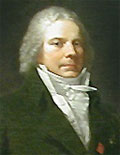Descendant of a noble family of Quercy, second son of Charles-Daniel comte de Talleyrand-Périgord, lieutenant-general in the royal army; educated at the Collège d'Harcourt (1762-1770) and the seminary of Saint-Sulpice in Paris (1770-1775); nominated abbot of Saint-Rémi-de Reims (1775); received a degree (1778) in theology from the Sorbonne; ordained priest (1779); named agent general of the Assembly of the Clergy (1780-1785); appointed bishop of Autun (17 Jan 1788 - 20 Jan 1791); elected (3 Apr 1789) as a representative of the clergy of Autun to the États-Généraux (Estates-General); joined the sessions of the Third Estate (21 Jun 1789) as a deputy of the Assemblée nationale (National Assembly) (1789-1791); elected President of the National Assembly (16 Feb 1790 - 28 Feb 1790); urged the repeal of the tithe and the nationalization of church property; took the oath of loyalty to the Civil Constitution of the Clergy (27 Dec 1790); was excommunicated by the Pope (1791); elected administrator of the département of Paris (1791); sent on a diplomatic mission to London (1792); denounced (5 Dec 1792) by the Convention nationale (National Convention) as a royalist supporter; lived in England (1792-1794) and the United States (1794-1796); on return to France, was appointed minister for external affairs (16 Jul 1797 - 20 Jul 1799); again appointed minister for external affairs by Napoléon Bonaparte (22 Nov 1799 - 9 Aug 1807); relieved of his ecclesiastical obligations by the letter of Pope Pius VII (29 Jun 1802); was instrumental in implementing Napoléon's foreign policy in Europe, but opposed wars against Austria, Prussia, and Russia; appointed grand chamberlain (11 Jul 1804); created sovereign prince of Benevento (5 Jun 1806 - 4 Jun 1815); negotiated the treaties of Pressburg (1805) and of Tilsit (1807); appointed grand vice elector (9 Aug 1807); split with Napoléon and was stripped of the title of grand chamberlain (29 Jan 1809); entered the negotiations with the Allied Powers on the eve of Napoléon's first abdication; nominated a member of the Provisional Government (1 Apr 1814); appointed minister and secretary of state for foreign affairs (13 May 1814 - 20 Mar 1815) during the First Restoration; created prince of Talleyrand and a peer of France (4 Jun 1814); participated in the Congress of Vienna (1814) and obtained restoration of the frontiers of 1792 for France; appointed president of the Council of Ministers (9 Jul 1815 - 26 Sep 1815) and minister for foreign affairs (9 Jul 1815 - 24 Sep 1815); named minister of state and grand chamberlain (28 Sep 1815); created duke of Talleyrand (31 Aug 1817) and was granted the title of duke of Dino by the King of the Two Sicilies (2 Dec 1817); served as ambassador of France to Great Britain (1830-1834).
Biography source: [2; 3] |

